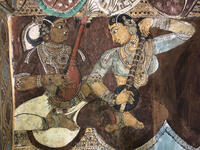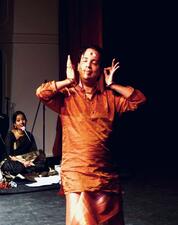
All are welcome to a lecture, performance and reception co-sponsored by the Yale Institute of Sacred Music and the Yale South Asian Studies Council.
3:30-5:00 p.m. Lecture by Professor Davesh Soneji, “Unbounded Tunes: Genealogies of Musical Pluralism in Modern South India.” Respondent: Prof. Anna Morcom (Sambhi Chair in Indian Music, UCLA)
5:00-5:45 p.m. Reception
6:00-7:00 p.m. Lecture-Demonstration by Prof. Hari Krishnan (Department of Dance, Wesleyan University), Vaaraki Wijayaraj (vocals), Kajan Pararasasegaram (Mridangam drum), and Mithuran Manogaran (violin).
The kirtana (“song of praise”) and padam (“verse”) are among the oldest extant song-forms on the Indian subcontinent. By the sixteenth century, in Southern India these songs circulate through complex social and aesthetic pathways, ranging from temple contexts to the salons of the region’s highly accomplished courtesans. These genres also permeate Tamil Islamic and Christian contexts, and by the nineteenth century, are also deployed in a range of markedly non-religious contexts. Attentive to material and social histories, musical theologies of Tamil Hinduism, Islam, and Catholicism, caste and community, and the politics of moral censure, this event brings together experts on South Asian music to discuss and perform these musical genres from a range of social, historical, and aesthetic perspectives.
Davesh Soneji is associate professor in the Department of South Asia Studies at the University of Pennsylvania. He holds a Ph.D. in Religious Studies from McGill University, and  his research interests lie at the intersections of social and cultural history, religion, and anthropology. For the past two decades, Prof. Soneji has produced research that focuses primarily on religion and the performing arts in South India, but also includes work on gender, class, caste, and colonialism. He is best known for his work on the social history of professional female artists in Tamil and Telugu-speaking South India and is author of Unfinished Gestures: Devadāsīs, Memory, and Modernity in South India (University of Chicago Press, 2012; Permanent Black, 2012), which was awarded the 2013 Bernard S. Cohn Book Prize from The Association for Asian Studies (AAS). He is also editor of Bharatanāṭyam: A Reader (Oxford University Press, 2010; 2012) and co-editor, with Indira Viswanathan Peterson, of Performing Pasts: Reinventing the Arts in Modern South India (Oxford University Press, 2008). Prof. Soneji has recently held positions as Visiting Professor at the Central University of Hyderabad in India, as well as Le Centre d’Études de l’Inde et de l’Asie du Sud (CEIAS) in Paris. Prior to coming to the University of Pennsylvania, Prof. Soneji taught at McGill University’s School of Religious Studies in Montreal, Canada for over twelve years.
his research interests lie at the intersections of social and cultural history, religion, and anthropology. For the past two decades, Prof. Soneji has produced research that focuses primarily on religion and the performing arts in South India, but also includes work on gender, class, caste, and colonialism. He is best known for his work on the social history of professional female artists in Tamil and Telugu-speaking South India and is author of Unfinished Gestures: Devadāsīs, Memory, and Modernity in South India (University of Chicago Press, 2012; Permanent Black, 2012), which was awarded the 2013 Bernard S. Cohn Book Prize from The Association for Asian Studies (AAS). He is also editor of Bharatanāṭyam: A Reader (Oxford University Press, 2010; 2012) and co-editor, with Indira Viswanathan Peterson, of Performing Pasts: Reinventing the Arts in Modern South India (Oxford University Press, 2008). Prof. Soneji has recently held positions as Visiting Professor at the Central University of Hyderabad in India, as well as Le Centre d’Études de l’Inde et de l’Asie du Sud (CEIAS) in Paris. Prior to coming to the University of Pennsylvania, Prof. Soneji taught at McGill University’s School of Religious Studies in Montreal, Canada for over twelve years.
Prof. Soneji’s more recent research spans a wide range of subjects related to the history of music in modern South India, including occluded traditions of Tamil Islamic music, Tamil Catholic music, Marathi kīrtan in the Tamil-speaking regions, the music of the Tamil theatre, and transoceanic sonic histories of the Tamil diaspora. Attentive to caste-based hierarchies of taste, Dalit sonicscapes, musical migration, musical dispossession, and the question of “popular Tamil music” as a historical phenomenon, this new work is forthcoming in a monograph titled Unbounded Tunes: Genealogies of Musical Pluralism in Modern South India. He is also presently editing a volume of essays entitled Caste, Community, and the Performing Arts of Modern South India (forthcoming, Routledge) that highlights new work by a group of emerging scholars, and with Anna Morcom, is co-editor of The Routledge Handbook of Indian Music. For the 2023-24 academic year he is a fellow at Yale University’s Institute of Sacred Music.
Hari Krishnan is a dancer, choreographer, scholar, and educator who specializes in Bharatanatyam, queer dance and contemporary dance from global perspectives. Krishnan’s  choreography explores post-colonial complexities in Indian dance and queer themes, as well as the intersection between traditional South Asian and global contemporary dance forms. His extensive body of work is based on critical perspectives on Bharatanatyam, fused with contemporary global dance styles and postmodern social critique. He is also the artistic director of inDANCE (indance.ca), which he founded in 1999. For over two decades, he had trained with hereditary courtesan teachers in South India who were the original repositories of Bharatanatyam. His work in this area engages both critically and ethically with issues of power and representation in Bharatanatyam’s pasts. Krishnan’s scholarly repertoire is as extensive as his choreographic one. His research covers historic and sociological themes, from queerness and global cultural politics in dance to representations of Bharatanatyam in film. His monograph, Celluloid Classicism: Early Tamil Cinema and the Making of Modern Bharatanatyam (Wesleyan University Press, 2019) won a special citation from the 2020 de la Torre Bueno First Book Award Committee of the Dance Studies Association, and has been hailed as “an invaluable addition to the scholarship on Bharatanatyam.” Some of his recent awards and nominations include a Jacob’s Pillow Lab Residency (spring 2024), Wesleyan’s Provost Research Award (2023), a National Dance Project Grant (2023) for his upcoming creation Rowdies in Love, and two Mellon Foundation Grants (2021 and 2023 with Professor Lionel Popkin and SADA, South Asian Diasporic Dance Artists).
choreography explores post-colonial complexities in Indian dance and queer themes, as well as the intersection between traditional South Asian and global contemporary dance forms. His extensive body of work is based on critical perspectives on Bharatanatyam, fused with contemporary global dance styles and postmodern social critique. He is also the artistic director of inDANCE (indance.ca), which he founded in 1999. For over two decades, he had trained with hereditary courtesan teachers in South India who were the original repositories of Bharatanatyam. His work in this area engages both critically and ethically with issues of power and representation in Bharatanatyam’s pasts. Krishnan’s scholarly repertoire is as extensive as his choreographic one. His research covers historic and sociological themes, from queerness and global cultural politics in dance to representations of Bharatanatyam in film. His monograph, Celluloid Classicism: Early Tamil Cinema and the Making of Modern Bharatanatyam (Wesleyan University Press, 2019) won a special citation from the 2020 de la Torre Bueno First Book Award Committee of the Dance Studies Association, and has been hailed as “an invaluable addition to the scholarship on Bharatanatyam.” Some of his recent awards and nominations include a Jacob’s Pillow Lab Residency (spring 2024), Wesleyan’s Provost Research Award (2023), a National Dance Project Grant (2023) for his upcoming creation Rowdies in Love, and two Mellon Foundation Grants (2021 and 2023 with Professor Lionel Popkin and SADA, South Asian Diasporic Dance Artists).
Anna Morcom, professor of ethnomusicology and holder of the Mohindar Brar Sambhi Chair of Indian Music with the UCLA Herb Alpert School of Music, works on music and  dance in India and Tibet from diverse perspectives that seek to understand the contemporary world and processes of change in and through musical culture. Her research encompasses ethnographic and oral historical methods and traditional as well as popular musics. She is currently working on a monograph on Hindustani music and two edited volumes: Creative economies of culture in South Asia: Craftspeople performers (Routledge, co-edited with Neelam Raina), and the Oxford Handbook of Economic Ethnomusicology (OUP, co-edited with Timothy D. Taylor). She is also the author of Unity and discord: Music and politics in contemporary Tibet (2004, Tibet Information Network); Hindi film songs and the cinema (2007, Ashgate); Illicit worlds of Indian dance: Cultures of exclusion (2013, Hurst and OUP, awarded the Society of Ethnomusicology’s Allan Merriam prize and the Marcia Herndon prize of SEM’s Gender and Sexualities section in 2014). She has also published articles and chapters in a range of peer-reviewed journals and edited volumes. She made a VCD album of Tibetan songs with the singer Tanzin Gyatso in Tibet in 2006, entitled sPrin Gyi Metok (‘Cloud flowers’).
dance in India and Tibet from diverse perspectives that seek to understand the contemporary world and processes of change in and through musical culture. Her research encompasses ethnographic and oral historical methods and traditional as well as popular musics. She is currently working on a monograph on Hindustani music and two edited volumes: Creative economies of culture in South Asia: Craftspeople performers (Routledge, co-edited with Neelam Raina), and the Oxford Handbook of Economic Ethnomusicology (OUP, co-edited with Timothy D. Taylor). She is also the author of Unity and discord: Music and politics in contemporary Tibet (2004, Tibet Information Network); Hindi film songs and the cinema (2007, Ashgate); Illicit worlds of Indian dance: Cultures of exclusion (2013, Hurst and OUP, awarded the Society of Ethnomusicology’s Allan Merriam prize and the Marcia Herndon prize of SEM’s Gender and Sexualities section in 2014). She has also published articles and chapters in a range of peer-reviewed journals and edited volumes. She made a VCD album of Tibetan songs with the singer Tanzin Gyatso in Tibet in 2006, entitled sPrin Gyi Metok (‘Cloud flowers’).
Morcom’s research has been supported by a number of grants from the Leverhulme Trust and the British Academy. She is the founder of SEM’s Special Interest Group on Economic Ethnomusicology. Morcom has been interviewed on Illicit worlds of Indian dance by various UK media including BBC Radio 4’s Thinking Allowed, and by India-based media including the national newspaper, The Hindu, the social justice magazine, Tehelka, and the independent news, information and entertainment organization Scroll.